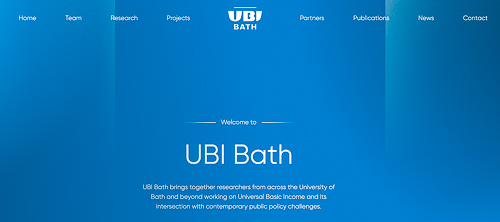
by Scott Santens | Feb 12, 2025 | News, Opinion
As the editor of Basic Income Today and a moderator for the Basic Income subreddit, I read a lot of stuff every year about UBI, somewhere around 100 articles a month. Below, I’ve compiled a list of the top ten articles I consider my favorites out of everything published in 2024.
To read the article, click here.

by Neil Howard | Jan 17, 2025 | Opinion
Photo by Hamid Roshaan on Unsplash
Social assistance is everywhere conditional, and in Pakistan it is no different. Either it comes with behavioural strings attached — ‘do this and we’ll help you, don’t and we won’t’ — or it is targeted, with receipt conditional on being a specific type of person or facing a particular type of problem (think Benazir Income Support Programme [BISP] and the extreme poor).
Those who defend this approach typically offer the same justifications. First, they argue, resources are limited, which means that we should give them to those most in need and make sure they use them well. Intuitively sensible, this position quickly gives way to the troubling claim that as the poor aren’t used to having any money, we should ‘guide’ them so that they don’t waste what they get. Inside this sits the pernicious, yet sadly widespread, prejudice that the poor are feckless and do not deserve our support.
Critics of these positions abound, as they do of conditionality more broadly.
To read the full article in Dawn, click here.

by Equal Right | Jan 8, 2025 | Opinion
How Cap and Share can end fossil fuel extraction, raise trillions for climate finance, and create a global universal basic income.
To read more, click here.

by Neil Howard | Jan 4, 2025 | Opinion
“When the authorities provide social assistance to those in need, it almost always comes with conditions attached. These include behavioural requirements or criteria determining who is and isn’t eligible for support.
Common examples include proving that you’re looking for a job, are too ill to do so, or that you fall into a particular category that policymakers have decided is worthy of aid – for example, working children or single parents.”
To read the full article, click here.

by Hilde Latour, Sarath Davala | Dec 8, 2024 | Opinion
Photo by Traxer on Unsplash
“…there are on the horizon two radical ideas that have the potential to create synergy which can revolutionize the way we are currently addressing the income vulnerability and different forms of deprivation in the world today. The two ideas are Bitcoin and Universal Basic Income: that is, providing a basic income to every human being on the planet by means of Bitcoin. What is common between these two ideas is that they are based on certain foundation human values: individual freedom and autonomy, human dignity and equity.”
To read the full article, click here.
by Guest Contributor | Apr 1, 2024 | Opinion
The evolution of climate action has reflected the need for affordable options. Universal basic income (UBI) has the unique opportunity to empower everyone to change the world. The warming environment necessitates rapid development and deployment of climate innovations. UBI can provide the accessibility that is crucial to the widespread adoption of solutions like solar panels, energy-saving appliances, and electric vehicles (EVs). This article will explain how UBI and climate change intertwine to create the perfect catalyst for environmental responsibility.
Basic Income and Climate Change
UBI advocates recognize the positive impact that policy changes like this can have on the environment. Basic income is an underutilized concept that outlines how the government would provide all citizens with a base-level income monthly or annually. Ideally, this would be unconditional and exist regardless of socioeconomic status. The intersection of basic income and climate change mitigation lies in the opportunities UBI can create to reshape consumer behavior, foster innovation, and provide a safety net for those most vulnerable to the impacts of environmental shifts.
Ensuring a basic income for all citizens can create a foundation that enables them to make sustainable choices without the constraints of financial insecurity. Financial stability can drive a shift toward eco-friendly practices, encourage investments in clean technologies, and empower communities to actively participate in the transition to a low-carbon or carbon-neutral economy. Moreover, basic income serves as a buffer against the inevitable career impacts that will stem from technological and environmental changes. Offering the chance to save money and seek employment in environmentally sustainable careers offers society a more resilient and sustainable future.
Incentives To Invest in Sustainable Tech
With a guaranteed income, people are not only granted financial stability but are also better positioned to engage in environmentally conscious choices. If entire paychecks aren’t being sunk into costs of living, people are more likely to use excess cash flow to take advantage of sustainable tech investments. There are federal and state tax incentives specifically designed to promote sustainable technology investment in solar panels, EVs, and the like. Some include:
- Business tax benefits;
- Federal solar tax credits;
- Low-interest loans;
- State tax credits;
- Utility rebates.
With the financial stability of UBI, low-interest loans could become easier to obtain. This can facilitate the adoption of climate-friendly solutions that have upfront costs that many couldn’t otherwise afford. This financial empowerment enables a broader segment of the population to actively participate in the green revolution.
Return on Investment
There are plenty of climate tech solutions that offer a return on investment, whether that’s through tax incentives or decreased utility costs. Heat pumps, for instance, are valuable investments that provide an energy-efficient alternative to traditional HVAC systems. Some of the perks of installing heat pumps instead of furnaces or air conditioners include:
- Less electric use;
- No smoke or fumes;
- Compact sizing;
- No fossil fuel use;
- Filtered air;
- Increased home value.
With the economic flexibility provided by UBI, people can purchase heat pumps that not only reduce their carbon footprint but also provide individualized, long-term savings. Lowered utility bills and higher ROI when selling homes are just two examples.
Ability To Reskill for Green Careers
Long-term financial stability often involves safeguarding your career for the future. Offering UBI can give people the flexibility to participate in continued education. The demand for jobs in many industries is going down as the climate is changing, literally and figuratively. The shift to more eco-conscious careers is palpable. As the job market evolves toward sustainability, UBI empowers people to pursue education and training in fields such as social purpose, renewable energy, environmental science, or sustainable agriculture.
Some of the careers in these fields are inherently entirely new. Upskilling or reskilling can give job seekers the edge they need to secure a long-term career in less volatile sectors like clean energy. With the assurance of a basic income, they can gain the freedom to seek further education and unlock opportunities to transition into these green careers. The financial stability UBI provides offers a safety net during the learning process, mitigating the risks typically associated with career changes.
Room for Investments in Decarbonization
UBI also affords people a newfound capacity to invest in companies dedicated to climate tech solutions. This democratizes climate action, breaking down financial barriers and enabling a broader segment of the population to become stakeholders.
By investing in these forward-thinking companies, people not only align their portfolios with sustainable values but also become integral participants in driving the transition toward a low-carbon future. This diversifies the pool of sustainable investors but also creates a more inclusive and impactful approach to decarbonization, fostering a collective commitment to building a greener and more resilient global economy.
Looking to the Future
With climate change comes the threat of extreme weather events and, ultimately, mass extinction. UBI could be the answer by allowing the widespread adoption of climate action. It’s not that people generally don’t want to get involved in saving the environment. If they are educated on decarbonization efforts and the incentives to participate, UBI can be the driving force to get them involved.
Written by: Beau Peters






